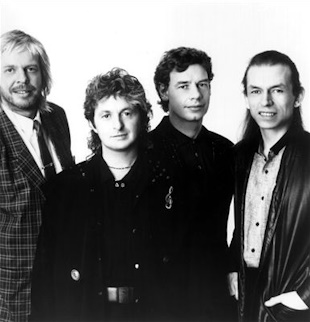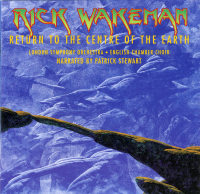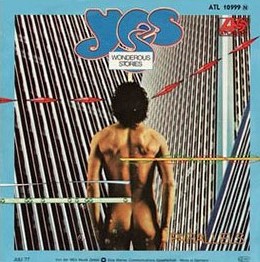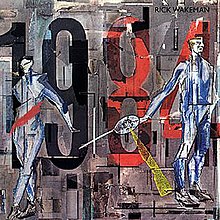
Richard Christopher Wakeman is an English keyboardist and composer best known as a former member of the progressive rock band Yes across five tenures between 1971 and 2004, and for his solo albums released in the 1970s. AllMusic describes Wakeman as a "classically trained keyboardist extraordinaire who plied his trade with Yes and developed his own brand of live spectacular in a solo act."

Sir Timothy Miles Bindon Rice is an English lyricist and author. He is best known for his collaborations with Andrew Lloyd Webber, with whom he wrote, among other shows, Joseph and the Amazing Technicolor Dreamcoat, Jesus Christ Superstar, and Evita; with Björn Ulvaeus and Benny Andersson of ABBA, with whom he wrote Chess; with Elton John, with whom he wrote Aida; and with Disney on Aladdin, the Lion King, both the stage adaptation of Beauty and the Beast and the live-action film adaption. He also wrote lyrics for the Alan Menken musical King David, and for DreamWorks Animation's The Road to El Dorado.

Tales from Topographic Oceans is the sixth studio album by English progressive rock band Yes, released on 7 December 1973 by Atlantic Records. It is their first studio album to feature drummer Alan White, who had replaced Bill Bruford the previous year. Frontman Jon Anderson devised its concept during the Close to the Edge Tour, when he read a footnote in Autobiography of a Yogi by Paramahansa Yogananda that describes four bodies of Hindu texts about a specific field of knowledge, collectively named shastras–śruti, smriti, puranas, and tantras. After pitching the idea to guitarist Steve Howe, the pair spent the rest of the tour developing an outline of the album's musical themes and lyrics.

Union is the thirteenth studio album by English progressive rock band Yes, released on 30 April 1991 by Arista Records. Production began following the amalgamation of two bands that featured previous and then-current members of Yes: Anderson Bruford Wakeman Howe (ABWH), consisting of vocalist Jon Anderson, drummer Bill Bruford, keyboardist Rick Wakeman and guitarist Steve Howe, and Yes, comprised at that time of bassist and vocalist Chris Squire, guitarist and vocalist Trevor Rabin, keyboardist Tony Kaye and drummer Alan White. The eight musicians signed with Arista and a combination of unfinished tracks by both groups were selected for Union. The album's sessions were problematic from the start, including disagreements between some of the musicians regarding the "merger" of the two bands, strained relations during the recording process, and decisions by the production team of Anderson and producer Jonathan Elias to bring in session musicians to re-record parts that Wakeman and Howe had originally completed.

Anderson Bruford Wakeman Howe (ABWH) were an English progressive rock band active from 1988 to 1990 that comprised four past members of the English progressive rock band Yes. Singer Jon Anderson left Yes as he felt increasingly constrained by their commercial and pop-oriented direction in the 1980s. He began an album with other members from the band's 1970s era: guitarist Steve Howe, keyboardist Rick Wakeman, and drummer Bill Bruford, plus bassist Tony Levin.

Going for the One is the eighth studio album by English progressive rock band Yes, released on 15 July 1977 by Atlantic Records. After taking a break in activity in 1975 for each member to release a solo album, and their 1976 tour of the United States and Canada, the band relocated to Montreux, Switzerland to record their next studio album. During rehearsals, keyboardist Patrick Moraz left the group, which marked the return of Rick Wakeman who had left to pursue a solo career after differences surrounding Tales from Topographic Oceans (1973). In a departure from their previous albums, Going for the One, with the exception of the fifteen-minute "Awaken", features shorter and more direct songs without an overarching concept, and saw Yes record with new engineering personnel and cover artists.

The Myths and Legends of King Arthur and the Knights of the Round Table is a studio album by English keyboardist Rick Wakeman, released on 27 March 1975 by A&M Records. It is a concept album based on the stories and people of the King Arthur legend. Wakeman started to write the music in 1974 while recovering from a heart attack and recorded it with his five-piece band the English Rock Ensemble, the New World Orchestra, and the English Chamber Choir.

Tormato is the ninth studio album by English progressive rock band Yes. It was released on 22 September 1978 on Atlantic Records, and is their last album with singer Jon Anderson and keyboardist Rick Wakeman before their departure from the group in 1980. After touring their previous album Going for the One (1977), the band entered rehearsals in London to record a follow-up. The album was affected by various problems, such as internal disputes over the direction of the music and artwork, and the departure of engineer Eddy Offord early into the sessions, resulting in the group producing the album themselves.

The Six Wives of Henry VIII is the first studio album by English keyboardist Rick Wakeman, released in January 1973 on A&M Records. It is an instrumental progressive rock album with its concept based on his interpretations of the musical characteristics of the wives of Henry VIII. After signing with A&M as a solo artist, Wakeman decided on the album's concept during a tour of the United States with the progressive rock band Yes. As he read a book about the subject on his travels, melodies he had written the previous year came to him and were noted down. The album was recorded throughout 1972 with musicians from Yes and The Strawbs, the group Wakeman was in prior to Yes, playing on the album.

1984 is the sixth studio album by English musician and composer Anthony Phillips, released in June 1981 on RCA Records. The album marks a change in musical style for Phillips as it is synthesiser-oriented compared to most of his previous albums which focused on more folk and acoustic music. After the music had been recorded, Phillips named the album after George Orwell's dystopian novel Nineteen Eighty-Four (1949).

Journey to the Centre of the Earth is the second album by English keyboardist Rick Wakeman, released on 3 May 1974 by A&M Records. It is a live recording of the second of his two concerts at the Royal Festival Hall on 18 January 1974, the premiere of his 40-minute orchestral rock piece based on Jules Verne's 1864 science fiction novel of the same name. It tells the story of Professor Lidinbrook, his nephew Axel, and their guide Hans, who follow a passage to the Earth's centre originally discovered by Arne Saknussemm, an Icelandic alchemist. Wakeman performs with the London Symphony Orchestra, the English Chamber Choir, and a group of hand-picked musicians for his rock band, which later became the English Rock Ensemble. Actor David Hemmings narrates the story.
References to George Orwell's 1949 dystopian political novel Nineteen Eighty-Four themes, concepts and plot elements are also frequent in other works, particularly popular music and video entertainment.

Fragile is the fourth studio album by the English progressive rock band Yes, released on 12 November 1971 by Atlantic Records. It was the band's first album to feature keyboardist Rick Wakeman, who replaced Tony Kaye after the group had finished touring their breakthrough record, The Yes Album (1971).

Return to the Centre of the Earth is a studio album by English keyboardist Rick Wakeman. It was released on 15 March 1999 on EMI Classics and is the sequel to his 1974 concept album Journey to the Centre of the Earth, itself based on the same-titled science fiction novel by Jules Verne. It tells a new story of three unnamed travellers who attempt to follow the original journey 200 years later, but from a different entrance. It is narrated by actor Patrick Stewart.

Lisztomania is the first soundtrack album by English keyboardist Rick Wakeman. It was released in November 1975 by A&M Records as the soundtrack for the Ken Russell's musical biographical film Lisztomania about the Hungarian composer Franz Liszt. Some tracks feature The Who's Roger Daltrey singing lead vocals.

No Earthly Connection is a studio album by English keyboardist Rick Wakeman, released in April 1976 on A&M Records. After touring worldwide in late 1975 in support of his previous studio album The Myths and Legends of King Arthur and the Knights of the Round Table (1975), Wakeman retreated to Herouville, France to record a new studio album with his rock band, the English Rock Ensemble. He based its material on a part fictional and non-fictional autobiographical account of music that incorporates historical, futuristic, and science-fiction themes.

Rick Wakeman's Criminal Record is a studio album by English keyboardist Rick Wakeman, released on 9 November 1977 on A&M Records. After touring his previous album No Earthly Connection in August 1976, Wakeman rejoined the progressive rock band Yes as they recorded Going for the One (1977) in Switzerland. When recording finished, he started work on a new solo record which took form as a keyboard-oriented instrumental album similar to that of his earlier album, The Six Wives of Henry VIII (1973), and loosely based on criminality. Several guest musicians play on the record, including Chris Squire and Alan White of Yes, percussionist Frank Ricotti, and comedian Bill Oddie on vocals.

The Living Tree is an album by Jon Anderson and Rick Wakeman, both previously members of progressive rock band Yes. The album was initially sold only as a souvenir during their UK tour in Autumn 2010, titled "The Anderson Wakeman Project 360" and from the Gonzo Multimedia online store. It was made available to the public on 29 November 2010.

Classic Tracks is a progressive rock album of re-makes of classic Rick Wakeman songs. It features Wakeman and four American musicians.

"Wonderous Stories" is a song by the English progressive rock band Yes, released in September 1977 as the first single from their eighth studio album, Going for the One. It was written by lead vocalist Jon Anderson, who gained inspiration for the song one morning during his stay in Montreux, Switzerland where the band recorded the album. The song reached number 7 on the UK Singles Chart and remains the band's highest-charting single in the country.



















